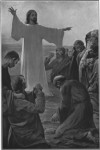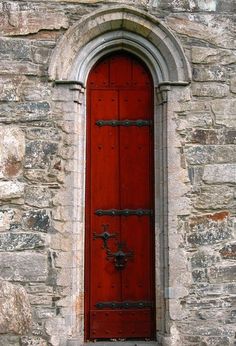From Luke 12-13
 Jesus tells a story where citizens of a city thought they were secure and could wander outside the protection of the city. He warns of a coming time when the master will arise and shut the door on them. They will not be allowed entry. We have to be careful not to presume we are protected by God, when we really need to repent and enter his kingdom.
Jesus tells a story where citizens of a city thought they were secure and could wander outside the protection of the city. He warns of a coming time when the master will arise and shut the door on them. They will not be allowed entry. We have to be careful not to presume we are protected by God, when we really need to repent and enter his kingdom.
This post is part of my bible in a year series.
Passage and Comments
In the recent context Jesus has been instructing people to repent or perish (Lk 13.1-5). He has rebuked a fig tree for not producing any fruit (Lk 13.6-9). A symbolic action representing what God will do to Israel because they have rebelled against him. These warnings concern the kingdom of God.
Jesus then gives incentives for belonging to the kingdom. He heals a woman with an evil spirit (Lk 13.10-17) and teaches the kingdom will start off small and grow into something big (Lk 13.18-21).
In today’s passage Jesus describes the difficulty involved in entering the kingdom.
22 He went on his way through towns and villages, teaching and journeying toward Jerusalem. 23 And someone said to him, “Lord, will those who are saved be few?” (Lk 13.22-23)
Jesus heads towards Jerusalem, the place where he knows he will die. Along the way he would have seen thousands of people. Perhaps more.
Someone asks him if there will only be a small number of people saved.
The question anticipates a future event where many people will die. He probably assumes the coming wrath of God and restoration of Israel.
And he said to them, 24 “Strive to enter through the narrow door. For many, I tell you, will seek to enter and will not be able.
25 When once the master of the house has risen and shut the door, and you begin to stand outside and to knock at the door, saying, ‘Lord, open to us,’ then he will answer you, ‘I do not know where you come from.’ (Lk 13.23-25)
‘Strive to enter’. Jesus uses an analogy of entering through a door into a kings city. He answers the question by instructing the person how to enter the kingdom. The door signifies entry into the kingdom. Presumably the equivalent of being saved. He also affirms the mans assumption not many will be able to enter.
The door to the kingdom is open. The time to enter is now.
‘Master of the house risen and shut the door’. Jesus explains there will be a time when the master of the kingdom will come and shut the door. The door has been open awhile. Perhaps many think they can wait for a later time and there are more important things to do. When the master arises he will shut the door and they will be left outside.
‘Lord, open to us’. Then it will be too late for them. They did not seize the opportunity when there was time. Standing outside they will ask the master to open the door for them. The master will say to them, ‘I do not know where you have come from’. He does not know their country or nation. He does not recognise them as his people.
26 Then you will begin to say, ‘We ate and drank in your presence, and you taught in our streets.’
27 But he will say, ‘I tell you, I do not know where you come from. Depart from me, all you workers of evil!’ (Lk 13.26-27)

‘We ate and drank in your presence’. The people say they were once members of the city the master is ruler of. They ate and drank with the master. A sign of fellowship. They heard his teaching. They claim to be his people.
‘Workers of evil’. The master repeats, ‘I do not know where you come from’. He denies they are his people. He calls them workers of evil. They were outside the city doing evil. They refused to enter the door when they had the chance.
28 In that place there will be weeping and gnashing of teeth, when you see Abraham and Isaac and Jacob and all the prophets in the kingdom of God but you yourselves cast out.
29 And people will come from east and west, and from north and south, and recline at table in the kingdom of God. (Lk 13.28-29)
‘You yourselves cast out’. When God’s wrath comes, outside the kingdom there will be weeping and gnashing of teeth. The people outside will be grieved and angered because they see God’s people inside but they themselves are outside.
‘People will come from east and west’. Not only will these from Israel be inside the kingdom. But many others from all nations will be inside and recline at his table in fellowship with God. He anticipates the entry of the Gentiles into God’s kingdom.
30 And behold, some are last who will be first, and some are first who will be last.” (Lk 13.30)
Hence those originally intended to be inside God’s kingdom will be left outside. And those who many thought would be outside, have been allowed to come in.
Jesus directly speaks to the people of Israel. He says many of them have wandered away from the LORD’s protection. They need to repent to enter his kingdom. But his message can be applied to his people through all time.
About Jesus
Jesus says, the door to the kingdom of God remains open. Are you inside the city or have you wandered outside? The only door into the city is narrow and those outside have to strive to enter. But be certain of this, only a few will be able to enter the door and be saved.
Those outside cannot presume on their religious credentials to be allowed entry. They are outside! Are you inside the city or have you wandered outside?
As our master, Jesus calls us to evaluate our relationship with him, be aware of our sins and shortcomings, our need for him, and take advantage of the refuge from wrath he provides.
Copyright © Joshua Washington and thescripturesays, 2016. All Rights Reserved.


